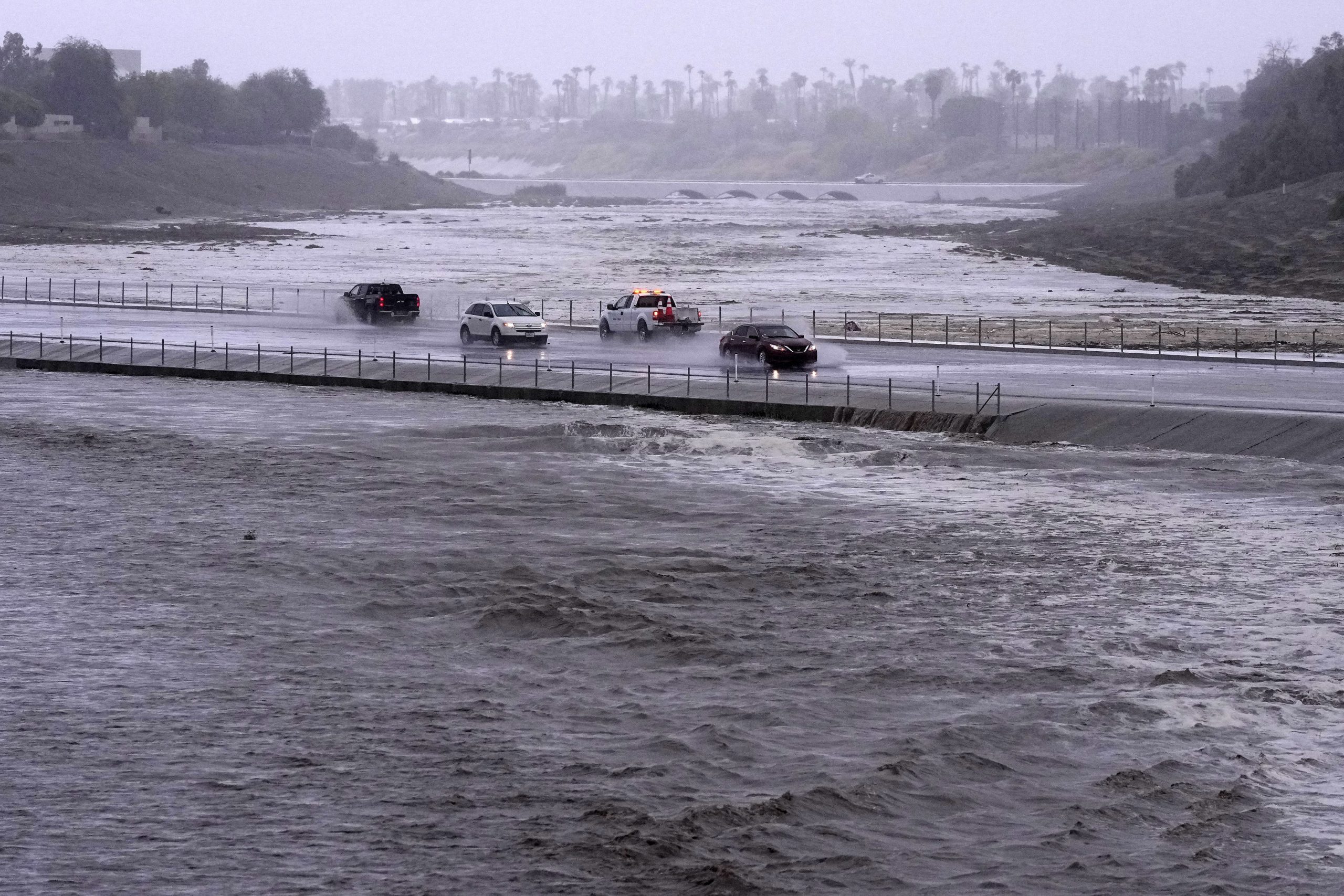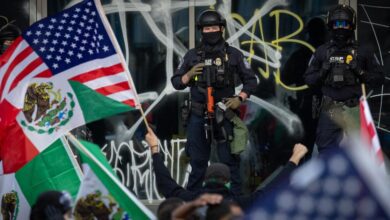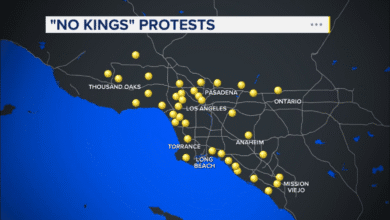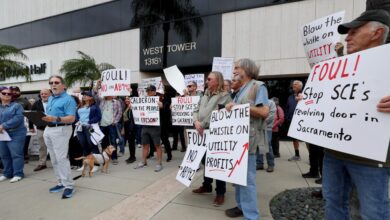California hit with tropical storm, earthquake and wildfire

California received a one-two punch from Mother Nature as Tropical Storm Hilary unleashed torrential record rains and flooding across Southern California, and an earthquake struck near Ojai — all during what has historically been the state’s wildfire season. The wild weekend prompted Gov. Gavin Newsom to head south, declaring a storm state of emergency even before crews began struggling to respond across a wide swath of the state.
On Sunday afternoon, the tropical storm made landfall in the northern Baja California peninsula, with wind speeds over 60 miles per hour as it barreled northward across Southern California’s coastal cities and pushed inland, swamping parts of the desert in knee-deep flood waters. Though Hilary had been downgraded from a hurricane, officials early today continued urging residents not to underestimate the damage it could bring — including flash floods, mudslides, thunderstorms, strong winds and power outages.
The storm is the “wettest tropical cyclone in state history” according to Newsom’s office, and the first tropical storm to hit Southern California in 84 years. The National Weather Service issued what it termed “life threatening” flash flood and tornado warnings, the Navy pulled its ships out of San Diego’s harbor, Death Valley National Park shut down, and public schools in Los Angeles and San Diego announced they would close today, with plans to resume classes tomorrow.
The state deployed 7,500 personnel in Southern California — including 3,900 Highway Patrol officers and 2,000 Caltrans workers — to aid local communities, and it dispatched resources for swift water rescue teams in high-risk areas.
- Newsom: “There’s an old ancient curse that loosely is translated to, ‘May you live in interesting times.’ It’s certainly interesting times — tornadoes, lightning strikes, I’ve got CalFire worried about wildfires…. I walked out of the Office of Emergency Services in San Bernardino, check my phone and learned about an earthquake.”
A tropical storm is a rare problem for California, particularly in August. The state has been historically protected from hurricanes because of its cold Pacific Ocean ocean currents, a wind pattern that pushes out major storms from the mainland and a downward air flow. But as The Los Angeles Times explained, “an unusual set of weather patterns” and warm ocean waters (“essentially hurricane fuel”) enabled the tropical storm to take shape. The last time California experienced a tropical cyclone was 1939, when one made landfall near Long Beach and claimed nearly 100 lives on land and at sea.
Tropical Storm Hilary serves as another watery test for Newsom. Earlier this year, when devastating floods upended thousands of Californians, the governor said the state would provide relief to victims who did not qualify for federal emergency relief, namely undocumented residents. Months after his promise of “rapid response,” his office announced $95 million in assistance for those flood victims.
How the state will handle similar cases in the wake of Tropical Storm Hilary remains a question.
Just hours after Hilary made landfall, a 5.1 magnitude earthquake rattled the Ventura County community of Ojai and its nearby region. Though no significant damage was reported, the two simultaneous events prompted internet-goers to dub Sunday a #Hurriquake.
And in a challenge more typical of California in August, on Saturday the 3,000-acre Deep Fire forced residents and resort-goers to evacuate in Trinity County, and the National Weather Service issued a warning in Eureka for elevated fire weather conditions caused by lightning strikes.
More on the storm: Although a Fox News-televised political debate between Newsom and his conservative political foil, Ron DeSantis, looks less likely to happen, the Florida governor did reach out on Saturday.
- DeSantis, on X (formerly known as Twitter): “In Florida, we know how challenging storms can be and have significant experience responding in their wake — we stand ready to help the people of California in any way we can.”
Newsom did not immediately respond, but Politico reported that “California officials said they appreciated the offer of support.” Governors routinely offer one another disaster assistance, of course. Yet DeSantis, running for the Republican presidential nomination, no doubt is also aware that this state is home to more than 5 million registered Republican voters (nearly a quarter of the voting populace).
CalMatters covers the Capitol: CalMatters has guides to keep track of your lawmakers, explore its record diversity, make your voice heard, understand how state government works and follow the state budget process.
CalMatters is hiring: We have several new newsroom opportunities, including for an economy reporter, a tech reporter, a politics and campaign reporter and a state Capitol reporter (in partnership with Voice of San Diego, and updated to no longer require applicants to live in Sacramento). See all our openings and apply here.
Other Stories You Should Know
1
Legislature heightens suspense on key bills

On California’s legislative calendar, two dates circled by Capitol watchers are the days of “suspense file” hearings — an opportunity for lawmakers, and special interests, to quietly snuff out bills they don’t want to see the light of day.
In May, the Assembly and Senate appropriations committees went through bills introduced in their own chamber, spiking more than 300 bills (though about 860 survived).
Next up, on the Friday before Labor Day weekend, those committees will pass similar judgment on bills that have already passed the other house. (Quick reminder: Bills with pretty much any cost attached get sent to the suspense file. In the hearings, measures can be killed rapid-fire, without much if any debate to speak of.)
With the session ending in mid-September, the Senate Appropriations Committee meets today and the Assembly Appropriations Committee meets Wednesday. So many more bills could go to their suspense files. In their first week back from summer recess, the appropriations committees quickly sent some key bills there, literally leaving their fates in suspense:
Criminal justice and public safety:
- Assembly Bill 28: Create an excise tax on guns to fund a violence prevention program.
- AB 280: Limit solitary confinement in prisons and jails — a revision to a similar measure last year, which Newsom vetoed.
Environment and climate change:
- SB 261: Require companies with $500 million in revenue to prepare climate financial risk reports.
Labor and the economy:
Public health:
- AB 518: Extend paid family leave to include “chosen family,” or loved ones without a legal or biological relationship, such as LGBTQ+ partners.
- AB 524: Add “family caregiver status” to the list of protected characteristics that could not be discriminated against when applying for or keeping a job.
- SB 616: Increase number of paid sick days from three to seven per year.
And a few others:
- SB 680: Enact civil penalties on social media companies that show users under age 16 content that could lead them to become addicted, develop eating disorders or inflict harm on themselves or others.
2
State shows workers the money

After more than four months of negotiations, a deal: The largest union of state workers announced late Sunday that it has a tentative deal with the Newsom administration — what SEIU Local 1000 calls its biggest three-year contract ever.
According to the union, the tentative agreement includes:
General salary increases of 3% retroactive to July 1, another 3% on July 1, 2024 and 4% on July 1, 2025 (or 3% if the state determines it can’t afford it).
A wage floor supplement of an additional 4%, retroactive to July 1, for workers in the 150-plus lowest-earning job classifications, those paying $20 or less an hour.
A recruiting and retention bonus of 5%, again retroactive to July 1, for 170 other job classifications, those with retention problems, with below-market salaries or with state salary structure issues.
A health insurance stipend of $165 a month, starting in December, for employees enrolled in a CalPERS plan.
- Irene Green, SEIU Local 1000 vice president for bargaining, in a statement: “This agreement reflects our best efforts to respond to the priorities our members identified in town halls and bargaining surveys. It promises to positively impact hundreds of job classifications across the state.”
SEIU Local 1000 represents nine of the state’s 21 bargaining units and about 100,000 state workers. In April, it sought a 30% pay hike, arguing that many state workers have been underpaid for years and can’t afford the high cost of living in California.
Union members have been holding rallies, candlelight vigils and other protests for months. Last week, several labor leaders were detained for civil disobedience during an “informational picket” that ended up blocking state Capitol offices. That was two days after the union received key support from the chairpersons of three labor committees in the Legislature.
Before the contract becomes final, the union rank-and-file must ratify it and state lawmakers and Gov. Newsom must sign off.
3
A taxing situation

In life, death and taxes are certain. In California politics, it’s taxes and ballot measures, apparently.
On the November 2024 ballot, voters could decide not one, not two, but three competing measures on taxes and what’s required to approve them.
First: A measure, already qualified and backed by businesses, would require any tax increases proposed by the Legislature to win approval by two-thirds of both houses and approval by a majority of voters statewide. Local tax measures would require the approval of two-thirds of a city council or board of commissioners and a majority of voters. (Now, legislative tax hikes require approval by the Legislature or voters, and some local taxes can be approved by a simple majority of an elected body.)
Second: In response, Politico reports, legislative Democrats are pushing a state constitutional amendment that would require any ballot measure changing voting thresholds to pass by that exact same margin to win approval — so two-thirds for the initiative above. But to get on the ballot, this amendment needs — you guessed it — a two-thirds vote in both the Assembly and Senate. And taxpayer groups are already trying to rally opposition to the measure.
Third: Housing advocates and local officials are pursuing another constitutional amendment that would lower the voting threshold from two-thirds to 55% to pass local measures to borrow money to build housing. This measure is vehemently opposed by taxpayer groups.
Election update: On Sunday, the California Democratic Party’s executive committee adopted its plan for divvying up delegates after the March 2024 presidential primary.
The 277 district delegates will be distributed proportionately, based on results in each of California’s 52 congressional districts, but candidates will have to get at least 15% of the vote to qualify for any. It’s likely not to make much difference, since President Biden is expected to face only token opposition for the nomination. Counting elected officials and other “automatic” delegates, California will be sending 496 delegates to the Democratic convention in Chicago next August. Also, since it’s Democrats we’re talking about, there are detailed goals to guarantee ethnic diversity among delegates.
Last month, the California Republican Party moved away from distributing its delegates by congressional district and toward a statewide, winner-take-all system — a change widely seen as a way to boost former President Donald Trump.
4
A death in the fields

His name is Elidio Hernández Gómez, and his death is putting a spotlight on a California law that is supposed to protect outdoor workers from heat, reports Nicole Foy of CalMatters’ California Divide team.
On Aug. 8, when Fresno-area temperatures soared to around 100 degrees, the 59-year-old tomatillo field worker collapsed and died. The coroner listed his cause of death as cardiovascular disease resulting from cholesterol buildup, but United Farm Workers blamed it on the extreme heat.
California is one of the few states with heat standards protecting outdoor workers. At a Friday press event in Delano, the farmworkers’ union, along with U.S. Sen. Alex Padilla, argued that California still struggles to enforce its workplace heat rules, and pointed to Hernández Gómez’s death to call for tougher federal protections.
- Teresa Romero, United Farm Workers president: “Elidio Hernández should not have died. Elidio had two young daughters who now don’t have a father.”
The California Division of Occupational Safety and Health said it is “gathering facts to determine whether to conduct an inspection” regarding Hernández Gómez’s death. If one launches, it would bring to focus Cal/OSHA’s initiative to establish satellite offices in the Fresno, Santa Barbara and Riverside counties. When it was announced on Aug. 10, the agency said these regions have seen “increased demand for responses to complaints, accidents and proactive high-heat inspections.”
Hernández Gómez’s family is also seeking answers about his death, reports The Fresno Bee. Their efforts could involve Newsom’s new pilot program, unveiled earlier in July, to provide free legal assistance to farmworkers involved in state labor investigations, regardless of their immigration status.
“We just want to know what really happened,” Hernández Gomez’s sister-in-law, Ana Navarro, told The Bee on Thursday. “We have not heard anything.”
CalMatters Commentary
CalMatters columnist Dan Walters: Squabbling among state and local officials is undermining the billions that California is spending on its homelessness crisis.
Why are San Diego area agencies selling personal data to U.S. Customs and Border Protection, asks Pedro Rios, director of the American Friends Service Committee’s U.S./Mexico Border program and a longtime human rights advocate.
Other things worth your time
Some stories may require a subscription to read
State GOP may drop opposition to abortion, same-sex marriage // Los Angeles Times
CA store owner fatally shot by man who confronted her about Pride Flag // The New York Times
Gavin Newsom’s political future hinges on San Francisco // Politico
CA gas station owners worry about workplace violence bill// The Sacramento Bee
Blue Shield eyes lower prescription drug prices by ditching CVS // San Francisco Chronicle
CA housing costs likely to surge as insurance firms retreat // The San Francisco Standard
First Amendment lawsuits test community college DEI rules // San Francisco Chronicle
Ed Department backs down on punishing researchers who testify against it // EdSource
California community colleges are in for major changes // Los Angeles Times
CA and US high courts diverge on church-state separation // San Francisco Chronicle
Writers’ Guild slams Netflix, Amazon and Disney as ‘new gatekeepers’ // Los Angeles Times
Federal judge blocks San Rafael’s ban on homeless encampments // San Francisco Chronicle
Berkeley’s new mental health crisis team to start Sept. 5 // Berkeleyside
Oakland school candidates are eligible, despite city error // East Bay Times
Police reform advocates say San Jose is watering down changes // San Jose Spotlight
How the Angels tried to pull the strings at Anaheim City Hall // Los Angeles Times







